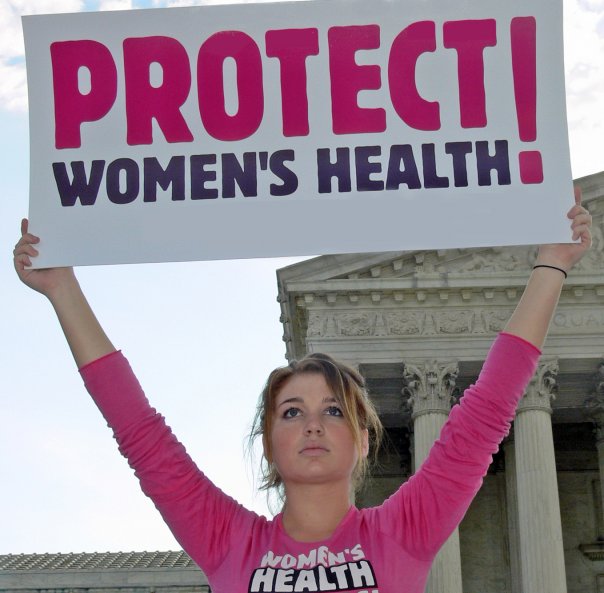Planned Parenthood and the AHCA’s sprint
Will they survive America’s health care marathon?
A woman marching for women’s rights during a recent march in D.C.
April 11, 2017
More than 20 years ago, Miranda Shelton’s parents left New York City’s booming film industry for a suburban town near Los Angeles to start a family.
This move resulted into Miranda’s birth. Faced with the dilemma of not having health insurance, Planned Parenthood became an option for Shelton’s pregnant mom.
“My mother was familiar with them. They were her only source of healthcare for many years,” said Shelton. “The doctor called her into the office and told her the news that she was expecting.
“Funnily enough, the doctor was expecting my mom to be upset and handed her a box of tissues preemptively. My mom was elated and began planning out the rest of her pregnancy with Planned Parenthood.”
On March 25, the United States Congress didn’t move forward with its attempt to repeal and replace the Affordable Care Act (ACA), a health care law that many Planned Parenthood patients rely on.
About 16 years later, Shelton was a teenager and had a pregnancy scare. She needed an access to the morning-after pill. At that time, California’s law prohibited the sale of the drug to persons under the age of 17.
“So without hesitation, my first thought was Planned Parenthood,” added Shelton. “I remember I went with one of my friends during lunch period, and once I got to the window and explained my situation, they immediately wanted to help.
“Not only did they give me the pill, but they spent 30 minutes speaking with me about how the pill would work, what it was doing, how my body would be feeling, and what to expect.
“They also gave me free condoms and really urged that I continue to have safe sex down the road. They were judgment free. They cared about what had happened to me, and how they could help. Even when they were reminding me to stay safe, it was never condescending.”
To this day, Shelton admits if she didn’t have a health insurance, Planned Parenthood would have remained the place for her care, gynecological or otherwise.
Unlike Shelton, who has been able to afford health insurance, millions of women nationally still depend on the Planned Parenthood for health care assistance.
Currently, in the State of Illinois, Planned Parenthood caters to the need of over 60,000 patients at 16 health care centers.
Although there hasn’t been a line item in the budget that says “Funding for Planned Parenthood,” a repeal would have placed the health care needs of Illinois’ 60,000 Planned Parenthood patients in jeopardy. A GOP-sponsored bill titled “American Health Care Act of 2017 ” called for a big cut on Medicaid, a “Federal-State health insurance program for low-income and needy people.”
According to Julie Lynn, Planned Parenthood of Illinois’ external relations manager, this defunding meant “Planned Parenthood would no longer receive Medicaid reimbursements for care provided to Medicaid patients. In Illinois, about one-third of the patients that come to our health centers use Medicaid. And no, these patients can’t just go somewhere else.”
For College of DuPage’s Feminist Alliance, the scare that these reimbursements are being used to fund abortion isn’t true. Federal law makes it illegal to use federal funding for abortion services.
“The funding that is being cut is used for health screenings like mammograms or for pregnancies to make sure everything is OK with the baby and the mother,” said Alyssa Smith, president of COD’s Feminist Alliance. “Services for transgender people are also being cut, and Planned Parenthood is one of the only safe places for transgendered people.
“Because of the lack of knowledge and misinformation spread throughout the U.S. and throughout the world, we are going to lose a lot of people when this could be easily prevented with actual knowledge and not alternative facts.”
The American Civil Liberties Union of Illinois believes the AHCA didn’t meet the legal criteria for a sensitive issue like healthcare. As a nonpartisan, nonprofit organization, it was viewed as an affront to women and their rights. In their opinion, the bill went as far as cutting the ACA’s guarantee of maternity care, a benefit most health plans cover.
“The bill slashed Medicaid by $880 billion, kicking millions off of Medicaid who had become eligible in 2010 when the ACA allowed single low-income adults, many of them women, access to health care,” said Mary Dixon, health justice policy director at ACLU of Illinois. “Low-income pregnant women, historic beneficiaries of Medicaid, were also losers under the AHCA, since reduced federal Medicaid funding and an altered Medicaid structure will mean fewer services and over time, and states cannot make up the cost differential.”
Barely weeks after Republicans didn’t get the required number of votes for President Donald Trump’s-sponsored health care bill, Vice President Mike Pence broke a tie to allow states to block federal money for clinics that provide abortion services.
States that have more liberals in their state legislature aren’t immune from threats of a roll back on Planned Parenthood funding. For example, Illinois Representative Peter Roskam has been vocal about Planned Parenthood funding and averred he would have supported the AHCA if the House would’ve voted on the bill.
Roskam aided in the introduction of H.R. 3134, a bill proposed in 2015 that had the sole objective to defund Planned Parenthood. He remains a member of the Congressional Pro-Life Caucus.
As the filibuster continues in Congress, a healthcare bill that appeases citizens from differing political and ideological standpoints is far from reaching its climax.




















